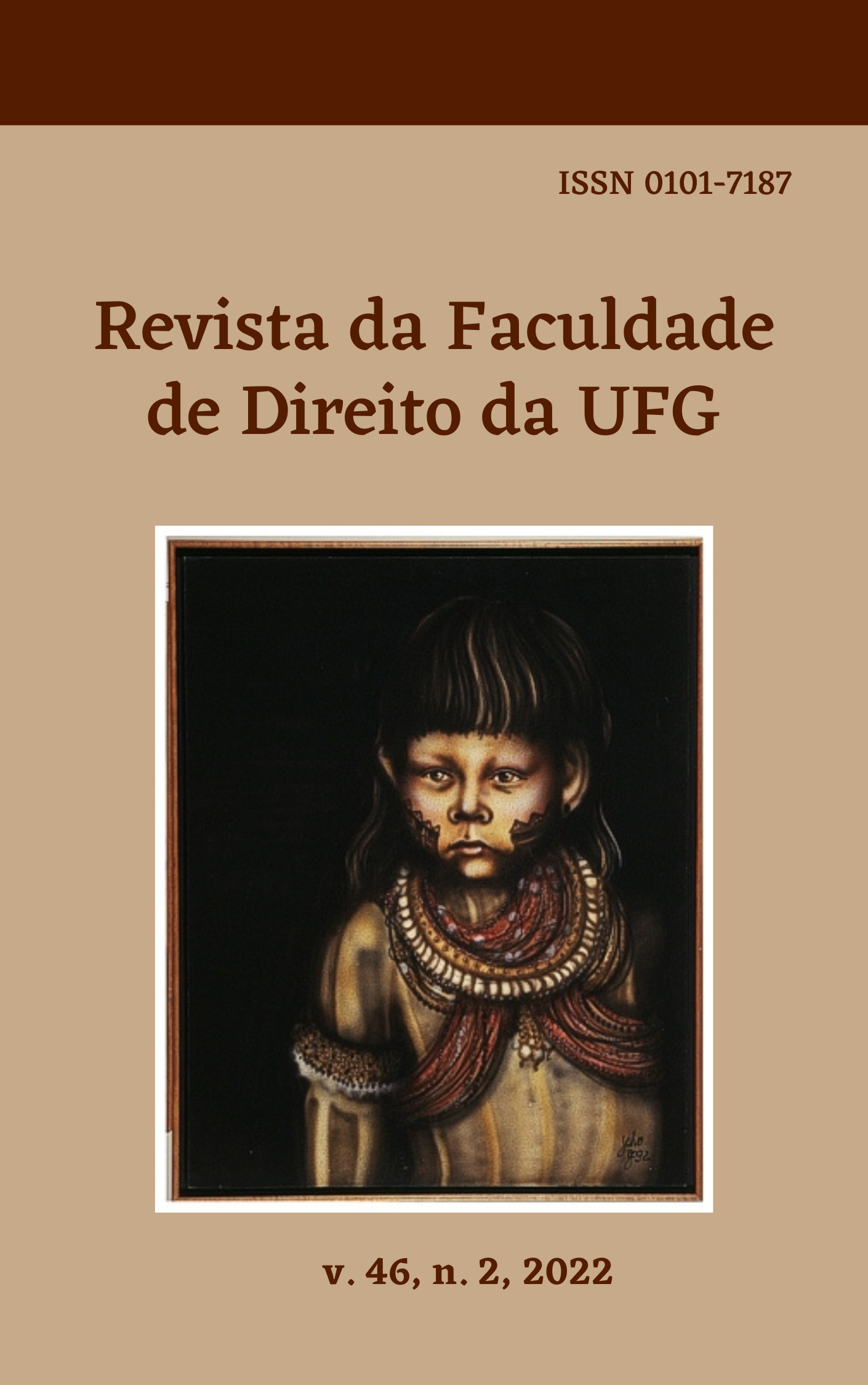Jugement politique, idéologie et utopie
éléments pour la construction d'un imaginaire juridique
Mots-clés :
Jugement Politique, Idéologie, Utopie, ImaginaireRésumé
Cet article présente une conception spécifique de l'imaginaire, un imaginaire juridique, à travers les concepts de jugement politique et d'idéologie développés dans les philosophies d'Hannah Arendt et de Paul Ricoeur. L'article clarifie ensuite la notion de jugement politique dans l'œuvre d'Arendt et comment l'idéologie et l'utopie sont elles-mêmes liées dans les réflexions de Ricoeur sur le juste. La recherche a adopté une revue de la littérature centrée sur ces trois concepts dans les travaux d'Arendt et Ricoeur comme méthodologie afin de développer une conception de l'imaginaire juridique qui est ancrée dans la pratique juridique ordinaire, mais qui a également une normativité radicale potentielle qui transcende les valeurs et les références. qui font déjà partie de la sphère juridique. L'article conclut que ce concept d'imaginaire juridique est lié à une projection collective de relations sociales et de structures politiques considérées comme plus souhaitables, ce qui le caractérise comme concept politique contestable essentiel : chaque groupe projette sur cet imaginaire ses valeurs, ses convictions et ses désirs, interprétant et opérationnaliser les normes juridiques à travers ces références particulières.
Téléchargements
Références
ARENDT, Hannah. The Life of Mind: The Groundbreaking Investigation on How We Think. New York: Harvest Book, 1971.
ARENDT, Hannah. Notas sobre a política e o Estado em Maquiavel. Lua Nova, v. 55–56, p. 298–302, 2002.
ARENDT, Hannah. Understanding and Politics (The Difficulties of Understanding). In: ARENDT, Hannah. Essays in Understanding, 1930-1954: Formation, Exile, and Totalitarianism. New York: Schocken Books, 2005. p. 307–327.
AUSTIN, J. L. How to do Things with Words. 2. ed. Harvard: Harvard University Press, 1975.
BERNSTEIN, Richard J. Arendt on Thinking. In: VILLA, Dana (Org.). The Cambridge Companion to Hannah Arendt. London: Cambridge University Press, 2001. p. 277–292.
CASTORIADIS, Cornelius. The Imaginary Institution of Society. Cambridge, UK: Polity Press, 1997.
CASTORIADIS, Cornelius. The Social Imaginary: A Critical Assessment of Castoriadis´s Psychoanalytic Social Theory. American Imago, v. 59, n. 2, p. 141–170, 2002.
CASTORIADIS, Cornelius. The Imaginary as Such. Social Imaginaries, v. 1, n. 1, p. 59–69, 2015.
CORNELL, Drucilla. The Imaginary Domain: Abortion, Pornography and Sexual Harrassment. London: Routledge, 1995.
CORNELL, Drucilla. At the Heart of Freedom: Feminism, Sex, and Equality. Princeton, New Jersey: Princeton University Press, 1998.
D´ENTREVÈS, Maurizio Passerin. Arendt’s Theory of Judgment. In: VILLA, Dana (Org.). The Cambridge Companion to Hannah Arendt. London: Cambridge University Press, 2001. p. 245–260.
DOLAN, Frederick M. Arendt on Philosophy and Politics. In: VILLA, Dana (Org.). The Cambridge Companion to Hannah Arendt. London: Cambridge University Press, 2001. p. 261–276.
EDLIN, Douglas E. Kant and the Common Law: Intersubjectivity in Aesthetic and Legal Judgment. Canadian Journal of Law and Jurisprudence, v. 23, n. 2, p. 429–460, 2010.
GUYER, Paul. Reason and Reflective Judgment: Kant on the Significance of Systematicity. Noûs, v. 24, n. 1, p. 17–43, 1990.
JACKSON, Emily. Imagining the Future: Drucilla Cornell’ s Transformations and Catharine MacKinnon’s Only Words. Law and Critique, v. 5, n. 2, p. 165–174, 1994.
LEFEBVRE, Alexandre. The Image of Law: Deleuze, Bergson, Spinoza. Stanford: Stanford University Press, 2008.
LEVI, Albert William. The Two Imaginations. Philosophy and Phenomenological Research, v. 25, n. 2, p. 188–200, 1964.
MAKKREEL, Rudolf A. Regulative and Reflective Uses of Purposiveness in Kant. The Southern Journal of Philosophy, v. 30, p. 49–63, 1991.
NASCIMENTO, Paulo César; FERNANDES, Mateus Braga. A phrônesis, o herói e a pólis: os paradoxos de Hannah Arendt como leitora dos antigos. Revista Brasileira de Ciência Política, v. 16, p. 273–292, 2015.
PIOMBO, Horacio J. J. El pragmatismo judicial de Oliver Wendell Holmes, Jr. y la teoría predictiva del Derecho. Doxa. Cuadernos de Filosofía del Derecho, v. 43, p. 189–218, 2020.
PIPPIN, Robert B. The Significance of Taste: Kant, Aesthetic and Reflective Judgment. Journal of the History of Philosophy, v. 34, n. 4, p. 549–569, 1996.
RICOEUR, Paul. Lectures on Ideology and Utopia. New York: Columbia University Press, 1986.
RICOEUR, Paul. Aesthetic Judgment and Political Judgment According to Hannah Arendt. In: RICOEUR, Paul. The Just. Chicago: Chicago University Press, 2000a. p. 94–109.
RICOEUR, Paul. Who is the Subject of Rights? In: RICOEUR, Paul. The Just. Chicago: Chicago University Press, 2000b. p. 1–10.
RICOEUR, Paul. The Act of Judging. In: RICOEUR, Paul. The Just. Chicago: Chicago University Press, 2000c. p. 127–132.
RICOEUR, Paul. The Concept of Responsibility: An Essay in Semantic Analysis. In: RICOEUR, Paul. The Just. Chicago: Chicago University Press, 2000d. p. 11–35.
SCHWARTZ, Jonathan Peter. Hannah Arendt´s Theory of Political Judgment. Thesis—Durham, NC: Duke University, 2014.
ZENKIN, Sergey. Social Action and its Sense: Historical Hermeneutics after Ricoeur. Ricoeur Studies, v. 3, n. 1, p. 86–101, 2012.
Téléchargements
Publié-e
Comment citer
Numéro
Rubrique
Licence
Les auteurs qui publient dans cette revue accordent à Revista da Faculdade de Direito da UFG une licence mondiale libre de droits, soumise aux termes et conditions de la Creative Commons Attribution 3.0 Brasil Legal License Creative Commons Attribution License
Les auteurs concèdent à RFD UFG tous les droits d'auteur sur les articles qui y sont publiés, qui les conservent en exclusivité jusqu'à l'avènement du domaine public sur ceux-ci.
























